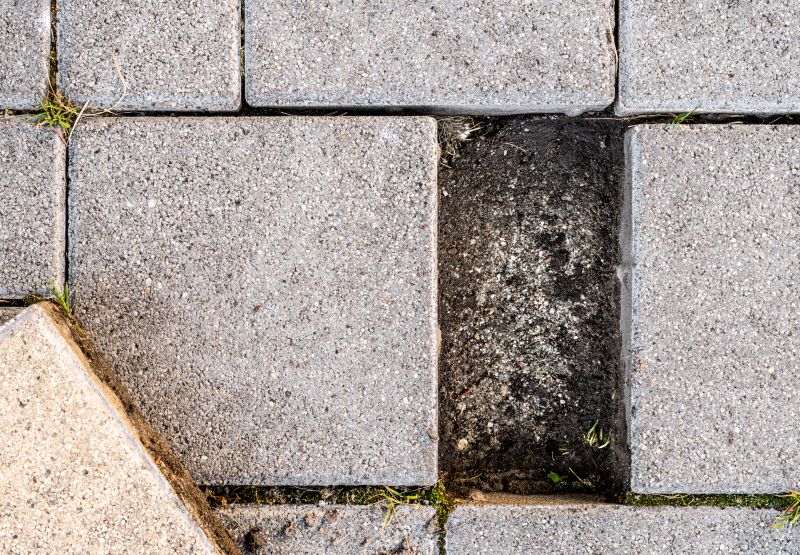Expert Picks For Concrete Pavers Repairs To Enhance Longevity
Find out which repair products are trusted by professionals to extend the life of your concrete paver surfaces effectively.
 Concrete paver repairs are essential for maintaining the appearance and structural integrity of paved surfaces such as walkways, patios, and driveways. Over time, pavers can shift, crack, or become uneven due to ground movement, heavy loads, or weather conditions. Addressing these issues promptly can help prevent further damage and prolong the lifespan of the paved area. Repair products range from simple patching compounds to more advanced leveling systems, providing options suitable for different types of damage and installation scenarios.
Concrete paver repairs are essential for maintaining the appearance and structural integrity of paved surfaces such as walkways, patios, and driveways. Over time, pavers can shift, crack, or become uneven due to ground movement, heavy loads, or weather conditions. Addressing these issues promptly can help prevent further damage and prolong the lifespan of the paved area. Repair products range from simple patching compounds to more advanced leveling systems, providing options suitable for different types of damage and installation scenarios.
Top Overall Option
Polymeric Paver Sand
Polymeric paver sand is a versatile product that stabilizes pavers by filling joints and preventing weed growth and shifting. It is easy to install, typically requiring sweeping into joints followed by watering to activate the binding agents. This type of sand offers a durable, long-lasting solution for maintaining the integrity of paved surfaces and is suitable for a variety of paver projects.
Types of Products For Concrete Pavers Repairs
Paver Crack Filler
Designed to fill and seal small cracks in pavers, helping prevent water infiltration and further damage.
Polymeric Joint Sand
A specialized sand that hardens after watering, stabilizing pavers and reducing weed growth.
Paver Repair Epoxy
A strong adhesive used to bond loose or broken pavers back into place.
Concrete Patch Compound
Suitable for filling larger cracks and minor surface damages on pavers.
Paver Leveling Sand
Fine sand used to level uneven paver surfaces before re-sanding or sealing.
Mortar Mix for Pavers
A durable mortar mix for securing pavers in place during repairs or replacements.
Sealant for Pavers
Protects repaired pavers from stains and weather damage, enhancing longevity.
Paver Replacement Tiles
Individual paver tiles used to replace damaged or missing units.
Joint Stabilizing Resin
A liquid resin that penetrates and stabilizes joint materials for added strength.
Concrete Paver Cleaner
A cleaning solution to prepare pavers before repair work, removing dirt and stains.
Paver Edge Restraints
Used to secure the edges of paver installations, preventing shifting and spreading.
Polyurethane Paver Adhesive
A flexible adhesive for bonding pavers and filling gaps.
Paver Joint Raker
A tool designed to help remove old joint material and prepare joints for new sand or filler.
Paver Lifter Tool
Helps lift and reposition pavers during repair or replacement tasks.
Flexible Repair Mortar
A mortar designed to accommodate slight ground movements without cracking.
Popular Choices
Widely used for stabilizing paver joints and preventing weed growth, this product is favored for its ease of installation and durability.
Commonly chosen for repairing small cracks, it helps maintain the surface and prevent water infiltration.
Popular for filling larger cracks or surface imperfections, providing a smoother finish.
Frequently used to protect and enhance the appearance of repaired pavers.
A go-to option for replacing individual damaged pavers with matching units.
Preferred for leveling uneven surfaces before re-sanding or sealing.
Used for securing loose pavers, especially in high-traffic areas.
Chosen for its ability to strengthen joint materials and reduce weed growth.
Popular for maintaining the shape and stability of paver edges.
Commonly used to prepare surfaces before repairs, ensuring good adhesion.
Favored for repairs where ground movement is expected, as it offers flexibility.
Proper repair involves assessing the extent of the damage and selecting the appropriate materials to ensure a durable fix. For minor cracks or small displacements, specialized patching compounds and crack fillers can restore the surface's appearance. Larger shifts or uneven surfaces may require leveling sands or polymeric sands that help stabilize the pavers and prevent future movement. In cases of significant damage, replacing individual pavers or sections might be necessary, often using specific adhesives or mortar mixes designed for paver installation.
Choosing the right repair product depends on various factors, including the type of pavers, the extent of the damage, and the location of the paved surface. Some products are formulated for quick setting and ease of use, suitable for DIY projects, while others are designed for professional installation and long-term durability. Proper preparation, such as cleaning the damaged area and removing loose debris, is crucial for optimal results. Regular maintenance and timely repairs can help preserve the aesthetic appeal and safety of paved surfaces over time.
Key Buying Considerations
- Type of damage to determine the appropriate repair product
- Compatibility of repair materials with existing paver materials
- Ease of application and drying time for DIY projects
- Durability and weather resistance of the repair product
- Size and scope of the repair area to select suitable quantities
- Ability of the product to prevent weed growth and water infiltration
- Flexibility of repair materials in case of ground movement
- Color matching options for seamless repairs
- Ease of cleaning tools and surfaces after application
- Long-term performance and maintenance requirements
- Availability of matching replacement pavers or tiles
- Budget constraints and cost-effectiveness of repair options
- Compatibility with sealing or finishing products
- Safety precautions and handling instructions
- Recommendations for professional vs. DIY repairs
